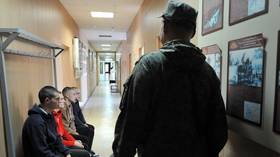Calls for PROBE as Germany’s apparent failure to pre-order enough vaccines sparks rift within Merkel’s govt coalition
The bumpy start of Germany’s vaccination campaign against Covid has sowed discord within Angela Merkel’s coalition, as her party partners demand answers from her health minister and call for a special investigative commission.
Germany’s mass vaccination against Covid-19 began just days ago but is already marred by Berlin’s and the EU’s failures, according to its critics. Of all issues with the Pfizer jab’s distribution, the apparent lack of doses at hand has raised the most questions.
On Monday, the German Health Minister Jens Spahn was confronted with a four-page questionnaire on the vaccination campaign problems, drafted by Vice-Chancellor and Finance Minister Olaf Stolz. The latter demands that the health minister clarify why Germany supposedly has failed to pre-order enough doses like other countries have.
Also on rt.com ‘Restrict contact to absolute minimum’: Merkel extends German national lockdown until at least end JanuaryThe list of questions, first reported by the German tabloid Bild, in particular asks why the EU Commission pre-ordered so few vaccine doses from Pfizer/BioNTech as well as Moderna, and why Germany did not purchase additional jabs from the two manufacturers that were not included in the EU contracts.
Stolz, a senior member of the Social Democratic Party currently in coalition with Merkel’s Christian Democrats, is also wondering if Berlin has done anything at all outside of the EU vaccination framework to obtain more vaccine doses from the two companies.
“Other developed nations have ordered significantly higher vaccine quantities in relation to population,” Stolz said in the document, adding that Canada, for example, had ordered enough jabs to vaccinate every single citizen “five times if all vaccine candidates are successfully developed.”
Several German regions have been reporting vaccine shortages due to “logistical problems” and insufficient dose quantities for quite some time. Earlier, the news about delayed vaccine shipments to the states of Berlin and Brandenburg sparked fury among Berlin authorities.
Also on rt.com ‘Great difficulties’: Pfizer vaccine delivery to Berlin CANCELLED for 1st week of January due to logistical problemsMassive vaccination is also unlikely to start anytime soon. Spahn said on Monday that an opportunity to take the jab would be available to all German citizens no sooner than in the second quarter of 2021. So far, vaccine doses are reserved for people over 80, care-home employees and hospital workers.
Over 316,000 people had received a jab by Tuesday morning, according to the Robert Koch Institute. That roughly amounts to just about 0.035 percent of the population.
‘Entrusted to amateurs’
Stolz’s unusually tough move has been described by German media as a “frontal attack” on Merkel and her minister, who comes from the Christian Democratic party (CDU), which Merkel headed until 2018.
The politician is not alone in attacking Merkel’s government: the slow pace of the vaccination campaign has been called a “scandal” by another Social Democratic MP, Florian Post, who called for the creation of special commissions of inquiry within the German Bundestag and the EU parliament. The suggested probe would investigate the actions of Berlin and the EU Commission that was responsible for vaccine purchases for all the EU nations.
“Ms. Merkel and Mr. Spahn swore in their oath of office to prevent harm to the German people. Yet, both have entrusted the procurement of the vaccines to amateurs surrounding the EU Commission President [Ursula] von der Leyen. Hundreds of thousands of elderly people and care home staff members in Germany, who are waiting for their vaccine, and the European idea itself are now suffering from their failure,” the MP told the German media.
“This scandal must be cleared up.”
Also on rt.com VaccinEUnity? European bloc launches Covid jab program – but Germany, Hungary & Slovakia already started ahead of scheduleThe demand for a probe comes just as Bild published a letter, in which the German health ministers, alongside those of France, Italy and the Netherlands, surrender the right to procure the vaccine to the EU commission while almost apologizing for the fact that “the parallel approach” of the four nations “caused concerns.”
The health officials assure von der Leyen that they “believe” that a “common single joint approach towards various pharmaceutical companies” is “of utmost importance” and pledge to make contributions to the EU emergency support instrument (ESI) to fight the pandemic instead. They also say they have not started any negotiations on the “funding agreement” with the British-Swedish company AstraZeneca.
Earlier, it was reported that Berlin, Paris, Rome and Amsterdam created a small vaccine alliance in spring to pre-order some jabs amid the lack of action from the EU, and had even reached some preliminary agreements with AstraZeneca. According to Bild, though, the initiative was ditched at the insistence of Merkel and other government heads – all supposedly in the name of European solidarity.
‘Symbol of solidarity’?
Concerns about the EU’s ability to procure enough vaccine doses surfaced well before the vaccination campaign even started. In mid-December, Germany’s Der Spiegel weekly rolled out a lengthy report in which it said that “the EU appears to have bought too little, too late” and “turned down hundreds of millions of vaccine doses that are now lacking.”
The paper said that Brussels had turned down offers from Pfizer/BioNTech as well as from Moderna that involved purchases for more vaccine doses – all while striking deals with companies that have failed to provide a viable vaccine candidate so far. It particularly signed an agreement with the French Sanofi, which said in December it would postpone the potential approval request for its vaccine candidate until at least the end of 2021.
Also on rt.com Germany still ‘very far from normality’ as daily Covid-19 death toll surpasses 1,000 for 1st time – health minister“Health care is actually one of the competencies that is reserved for the member states in the EU. But the vaccine supply was meant to serve as a symbol of solidarity,” Der Spiegel noted. Solidarity is also something Spahn is calling for now.
“In this really difficult phase of the pandemic, I believe citizens rightly expect unity and determination from their government,” the minister told ARD on Tuesday morning while accusing his Social Democratic coalition partners of opportunism.
He also shot down the criticism coming from the SPD, saying they were trying to “be both the government and the opposition at the same time” ahead of the upcoming elections in an apparent bid to secure broader support, while also predicting it would hardly score them points. CDU’s acting head Annegret Kramp-Karrenbauer also called it a “cheap attempt to campaign in the midst of the pandemic.”
Notably, the German health minister continues to deny the problem exists. “The problem is not the amount ordered. The problem is the low production capacity at the beginning with extremely high demand worldwide,” Spahn told Rheinische Post newspaper, adding that “enough” vaccine doses had been ordered.
Also on rt.com Germany to face wave of bankruptcies & soaring unemployment with Berlin poised to extend Covid-19 lockdown – expertsIf you like this story, share it with a friend!














